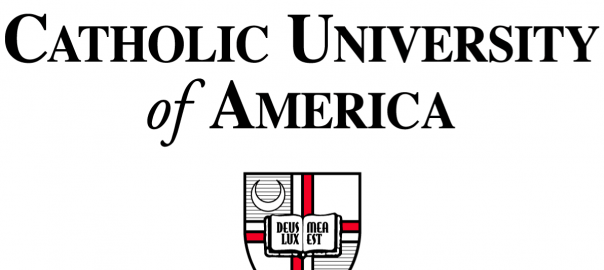June 21-24, 2015
* * * The deadline for submission of abstracts is February 1, 2015 * * *
The Seventh North American Syriac Symposium will be held at The Catholic University of America on June 21-24, 2015. Held every four years since 1991, the North American Syriac Symposium brings together university professors, graduate students, and scholars from the United States and Canada as well as from Europe, the Middle East, and India, in particular from the State of Kerala. The Symposium offers a unique opportunity for exchange and discussion on a wide variety of topics related to the language, literature, and cultural history of Syriac Christianity, which extends chronologically from the first centuries CE to the present day and geographically from Syriac Christianity’s homeland in the Middle East to South India, China, and the worldwide diaspora.
The theme for the 2015 CUA Syriac Symposium will be ‘Ad Fontes: Sources for Syriac Studies’. Given the tremendous growth in Syriac studies over the last two decades, we would like to celebrate the rich and varied sources on which the field is built, from manuscripts and inscriptions to architecture, from objects of art to oral tradition. Thus, we encourage submissions that reevaluate well-known sources, investigate lesser-known sources, and bring to light entirely new ones. Submissions that reflect on disciplinary, theoretical, and methodological approaches to the sources are also welcome. No original submission will, however, be rejected on account of its subject, so long as it relates to Syriac studies and meets the scholarly standards established by the 2015 organizing committee.
Based on the response to this Call for Papers, a number of sessions, each consisting of three or four papers, will be put together. These may include some of the following:
(1) Syriac Christianity in its Greco-Roman context.
(2) Syriac Christianity and Judaism.
(3) The Syriac Bible: Old Testament, New Testament, and Apocrypha.
(4) Ephrem.
(5) Aphrahat.
(6) The fifth and sixth centuries and the development of separate West-Syrian and East-Syrian traditions.
(7) Syriac Christianity and early Islam.
(8) Syriac Christianity in the 11th-13th centuries and the ‘Syriac Renaissance’.
(9) Syriac Christianity in the modern period and its contacts with the West.
(10) The Syriac-Christian diaspora in the 20th and 21st century.
(11) Literary genres in Syriac Christianity, or more specifically: biblical interpretation, hagiography, historiography, poetry, philosophy.
(12) Asceticism in the Syriac Christian context.
(13) Syriac liturgical traditions.
(14) Syriac language and linguistics.
(15) The study of Syriac manuscripts.
(16) Art and material culture of Syriac Christianity.
(17) Connections between Syriac Christianity and Armenian, Coptic, Ethiopian, and Georgian Christianity.
(18) Christian Arabic as part of the Syriac heritage.
Papers will be 20 minutes plus 10 minutes of discussion. Submissions can be of one of two types:
1. Individual Paper. Anyone who is submitting a paper individually is required to submit an abstract of approximately 250-350 words in addition to contact information. The symposium organizers will assign accepted paper proposals to a session.
2. Panel. A panel consists of three or four papers dedicated to a specific topic or theme. Anyone who is organizing a panel is required to submit an abstract of approximately 250-350 words for each of the papers in the panel along with the contact information for each panel participant. The panel organizer should also submit a title for the panel as well as a suggestion for a moderator. Panel participants should send their abstracts to the panel organizer who will then submit all of the panel abstracts to the symposium organizers.
The submission of panels is especially encouraged. All submissions should be sent in an electronic version (both pdf and Microsoft word document) to nasyriacsymposium@gmail.com. The deadline for submission is February 1, 2015. In order to ensure the widest range of participation in the conference, individuals will be allowed to present only one paper at the symposium.
In addition to standard papers and panels, there will be four keynote lectures:
(1) Joseph P. Amar, Professor, Department of Classics, Department of Theology, University of Notre Dame
(2) Adam H. Becker, Associate Professor of Classics and Religious Studies, New York University
(3) Bas ter Haar Romeny, Professor of Ancient Mediterranean and Middle Eastern History, VU University Amsterdam
(4) Dorothea Weltecke, Professor of History of Religions, Universität Konstanz
Additional information for the Symposium can be found at the following website:
http://semitics.cua.edu/north-american-syriac-symposium.cfm
The website now contains information about housing and registration. Registration must be completed by Friday, April 24, 2015. Additional information will be posted on the website soon.
All papers presented at the 2015 CUA Syriac Symposium can be submitted for review for publication in a volume that will be published by CUA Press and edited by Aaron Butts and Robin Darling Young. The submission date for the final version of papers for consideration in this volume is Aug. 15, 2015. Submitted papers will be peer-reviewed both by the editors of the volume and by CUA Press.
If you have any questions, do not hesitate to write to nasyriacsymposium@gmail.com.
We look forward to welcoming you to CUA in the summer of 2015!
Best regards,
Aaron Butts, symposium organizer
on behalf of the local steering committee:
Aaron M. Butts, The Catholic University of America (organizer)
Robin Darling Young, The Catholic University of America (chair)
Monica J. Blanchard, The Catholic University of America
Scott Fitzgerald Johnson, Dumbarton Oaks
Joel Kalvesmaki, Dumbarton Oaks
Stephen D. Ryan, Dominican House of Studies
Shawqi Talia, The Catholic University of America
Janet A. Timbie, The Catholic University of America
Lev Weitz, The Catholic University of America
===================
Peace,
-Steve

